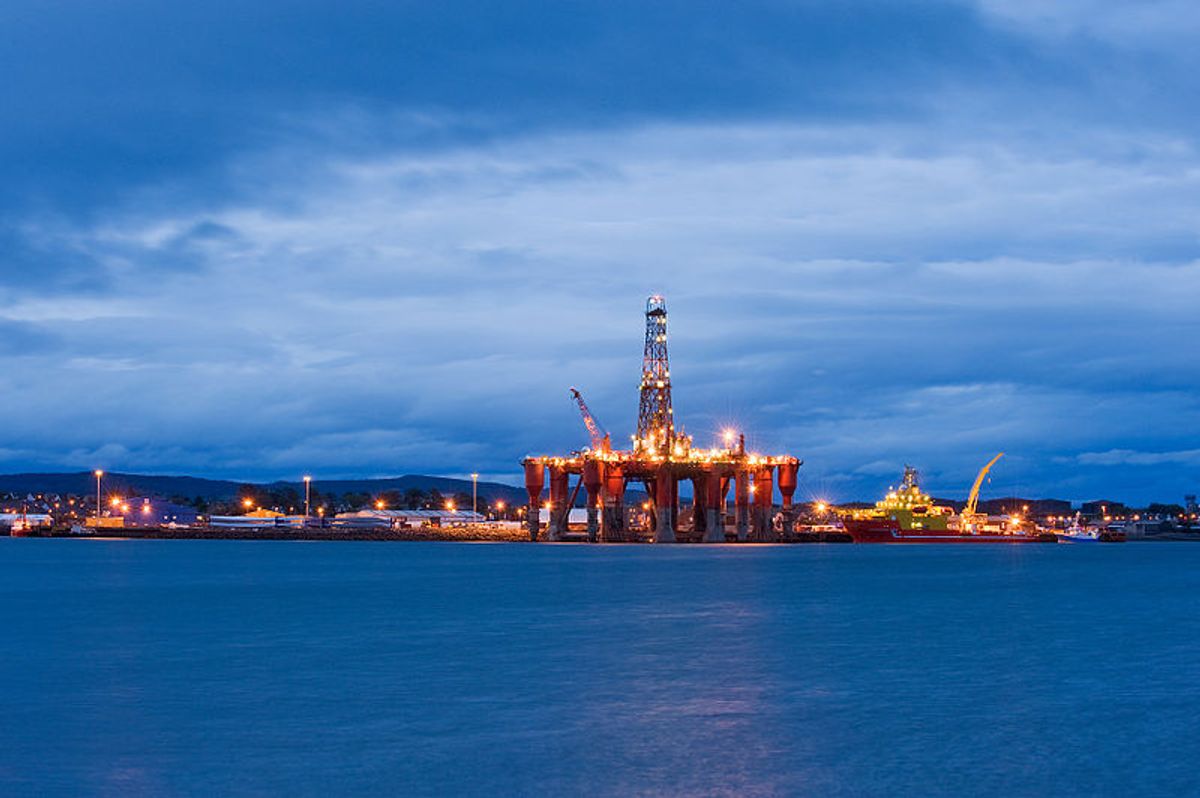What's scarier: being stranded at sea, stuck in an ominous fog, or forced to confront the monstrous motives of the fossil fuel industry? Well thanks to The Rig, the highly bingeable new sci-fi series from Amazon Prime Video, you don't have to choose.
Rather than using sci-fi tropes such as of a giant sea monster or a devastating natural disaster acting as a stand-in for climate change, The Rig is a contemporary thriller rooted in the interpersonal conflicts that arise when a group of people learn their future has been uprooted due to forces beyond their control.
The series focuses on a crew of North Sea oil workers who discover their offshore drilling platform is about to be decommissioned by its owner Pictor Energy, a (fictional) major player in the United Kingdom's energy market. Soon, a mysterious fog engulfs the operation, making it impossible for the crew to return to the nearby Scottish mainland.
John Carpenter fans will recognize where the show must go from here, albeit with a Build Back Better twist: Workers begin to spiral into madness, be it from contact with supernatural forces buried deep beneath them, or upon learning that their oil industry employer is not coming to save them. Talk of retraining workers into green-based jobs creates added division between the blue- and white-collar ranks, with seasoned workers calling plans to send grown men back to school "embarrassing."
Calls for industry retraining, of course, aren't merely a work of fiction; they've been sweeping the oil and gas fields in Europe and the United States for years as governments and the private sector attempt to quell global emissions. Many oil workers know that a transition in the field is underway, though unlike in The Rig, a majority may already have skills that could translate to other energy sectors. And according to one survey, half of the rig workers in the North Sea, a region that supports over 200,000 jobs, want to be retained for work in offshore wind.
But despite calls for increased transitions to wind and other renewables in the region, the United Kingdom recently announced more drilling in the North Sea, mostly in the name of domestic energy production. Climate groups have called the decision unlawful, and the Scottish government recently announced that they do not support the expansion of oil and gas in the area.
Throughout writing and shooting the series, series creator David Macpherson said he was inspired by the decommissioning of oil rigs and the energy transition. He wanted the show to speak to the stories of the people who work on the rigs, from old rig workers to green management with new ideas. "As much as we want to transition away from fossil fuels as quickly as possible, industrial decline is a process that often isn't managed very well, particularly in the United Kingdom," Macpherson told Grist. "We have a long history of not looking after workers when these big industrial changes come about."
Macpherson, a former environmental policy worker for the Scottish government and the son of a North Sea oil worker, said he wanted the series to act as a way of bringing the interpersonal conflict to the discussions of climate change and energy transition, but through an entertaining medium. "I've got a great deal of respect for the people who work in these places and these industries," he said. "We get pushed into false dichotomies and I wanted to use the show to hopefully bring a bit more nuance to these discussions."
Though the series is currently streaming globally, Macpherson said he wanted it to feel like a Scottish show in its origin and location, with North Sea oil acting as a microcosm for the rest of the world's energy industry disputes. "We get a lot of post-apocalyptic dramas where the climate disaster has happened in the past and we're in a sort of a different Earth, but I really wanted to focus on the here and now," Macpherson said.
The Rig comes at a moment when talks of a global fuel transition, unstable economies, and energy scarcity are more prevalent than ever. Premiering at the beginning of the year, moments in the series nod to workers who have already gone through a global pandemic; some workers pontificate that their underwater woes may be caused by the Russian military as opposed to a supernatural aquatic nemesis.
At times, the heavy-handed talk of energy, climate, transition, and environmental harm reminds viewers of what it is, an action, sci-fi, thriller, trying to fit a lot of drama, knowledge, global issues, and supernatural elements into six episodes. From a horror perspective, there's plenty of real-life source material. Oil rig workers have died, been stranded for days, and face grueling conditions to maintain energy needs and record profits for oil companies.
Throughout the series, which is growing in popularity with American streamers and already receiving praise from horror icons like Stephen King, talk of both a once and future wave hangs heavy. Even the subject of a changing tide causes workers to tense up and brush off the unknown future with playful, pointed banter of "going green."
Taking a page out of Ridley Scott's Alien trilogy, the real villain of The Rig isn't apparent until the end, when more information about Pictor Energy comes to light. In a not-so-subtle nod to the Exxon internal memos, it turns out the company knew about the underwater organism and its effects the whole time.
But don't let the spoilers deter you: Whether you're a fan of supernatural suspense films, a rapid environmental news reader, or both, The Rig is worth a watch. The themes of climate disaster, or as the rig's foreman puts it, "punching the Earth until it punches back" might not be new to the genre, but the series takes the audience deeper. With talks of renewable energy, carbon capture, and sea monsters rising from the deep, The Rig is able to compress energy headlines and modern sci-fi into a mostly digestible thriller worth exploring.




Shares